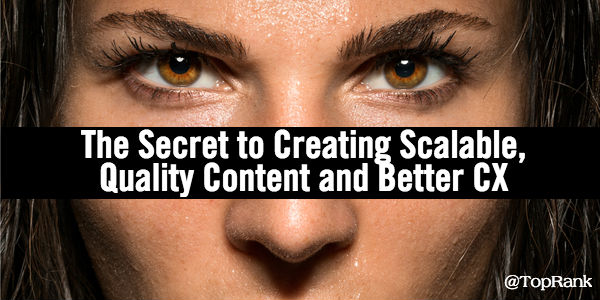
A woman walks into a retail store and looks around, not finding what she’s there for. She approaches a sales associate and asks, “Excuse me, can you show me where the top of the funnel is? I need to be confronted by every touchpoint of your predetermined sales process before I can purchase something”.
Not one of your customers is doing this.
So why do brands continue to drive content marketing programs based on a linear, sequential buying journey? With so many consumers numb to brand messaging and increasingly blocking advertising, how can marketers do a better job of connecting with and engaging customers with content?
One of the first admissions recovering funnel marketers need to make is that the funnel is dead. The customer buying experience is more like a tangled mix of omnidirectional customer journeys driven by myriad factors, many of which brands no longer have control over. Considering all of those possible influences can be overwhelming, especially when expectations of content performance are higher than ever.
The good news is that content marketers can achieve quality content at scale while creating much better experiences for customers with that content by making influencer collaboration part of the strategy.
Content drives all aspects of the customer journey from discovering content to education and inspiration to taking action. There are many influences when it comes to customers and content including other people who are influential.
In fact, there are some very important trends happening in the influencer marketing world that were surfaced in our research with influencer relationship platform, Traackr. What is working, what is not? What are the differences between B2B and B2C? How are companies budgeting and what are the best practices and case studies to learn from?
For a preview of these top Influencer Marketing trends and more, be sure to see this excellent interactive infographic created by our friends at the interactive content marketing platform Ceros of the Influence 2.0 Report by Brian Solis (in partnership with Traackr and my agency, TopRank Marketing).
Lucky 13 considerations for an integrated approach to influencer generated content:
1. Thinking about customer insight as it relates to information discovery, consumption and acton through the lens of influence opens up some very interesting doors of opportunity. In fact, when marketers integrate influencer marketing at the content marketing strategy level, it becomes a compelling and long term opportunity that most overlook.
2. For example, consider content discovery: A study by Augure reports that 93% of marketers implementing influencer marketing say it is effective to build brand awareness. And Burst Media reports that marketers are getting nearly a 10 to 1 return on earned media value from working with influencers on content.
3. Why hire a PR firm for media relations when you could work with influencers to create editorial placements that get ten times the reach? Actually, I think “working with PR” should be an “also” not an “instead of”. Media Relations and advertising investments with influencer content is a winning combination, not an either/or.
4. Content is King and customers are everything else. When it comes to content engagement, you have to decide what kind of content your customers prefer with considerations for topics, format, length, media type and even what devices they use.
5. Influencers lead and buyers follow. In his research, Dr. Jonah Berger of the Wharton School, reports that 82% of consumers follow expert recommendations. Twitter reports that 49% of consumers rely on influencers for product suggestions. Those are compelling stats relevant to how brands can work with influencers that can guide the kind of content to engage your customers in more effective ways.
6. Build it and they will come doesn’t work and neither does build and promoted the heck out of it and they will buy. It might, but there are no guarantees. According to research by Content Marketing Institute and MarketingProfs, marketers are not overwhelmingly confident about the effectiveness of their content.
7. Content effectiveness goes up with influencer collaboration. Content Marketing Institute has reported a 10X boost in conversion rates when influencers are involved. Even more compelling is that influencer marketing was found to have 11X better annual ROI over traditional marketing, according to a study by Tapinfluence, White Wave and Nielsen.
8. What good is acquiring customers if they don’t stay customers? A study from McKinsey reports a 37% higher retention rate with customers acquired through influencer content.
9. The solution to better content discovery, engagement and action is the integration of content and working with influencers. The study that we partnered with Traackr and Brian Solis of Altimeter on agrees: 80% of marketers surveyed reported the area of business most impacted by working with influencers was content marketing.
10. This is why my definition of influencer marketing is focused on content:
“Influencer Marketing develops relationships with internal and industry experts with active networks to co-create content that helps drive measurable business goals.“
11. Funnel myth and the influencer warm up. With a relationship and content-focused approach to influencer marketing, customers aren’t looking for a mythical funnel as they visit their favorite online or neighborhood store. Instead, the business warms the buying journey with product recommendations from people that buyers already trust to make recommendations.
12. Pick and choose your influencers wisely. For some customers that might be a famous actor, athlete or champion of business. For other customers it might be a famous or niche social influencer. Discounting either famous or micro-influencers is to discount sources your customers actually trust.
13. It pays to dig in to better understand customers in terms of their content preferences including who influences them and about what, relative to your brand’s products and services. Instead of speculating about topics, keywords and stories, why not actually talk to your customers and find out: What triggers them to look for solutions? What is their pain? What questions do they have that your brand and influencer content can answer? Creating utility for buyers through brand and influencer generated content can be instrumental for creating more findable and meaningful content experiences.
How to jumpstart an influencer generated content program:
1 – Get expert help. Do you know who the top influencers are for your customers relevant to your industry? Do you already have relationships with those influencers? Does your competition?
Research the market, find out who your customers influencers are, big and small. Then make a plan that identifies how collaborating with those influencers on content can be tied to business goals..
2 – Invest in technology. Sure, you could use Twitter search or Followerwonk and a spreadsheet to create a list of influencers, but you could also bring a spatula to a gun fight – if you get what I mean.
Influencer marketing technology will help you intelligently identify, qualify, and engage with influencers as well as to manage communications and measure performance of your work together. There are highly useful, fundamental tools like BuzzSumo or specialty platforms like GroupHigh or Upfluence for bloggers, LittleBird for Twitter or more enterprise focused solutions like Traackr and Onalytica. There are also marketplaces like TapInfluence, Collective Bias or Linqia where you can “shop” for influencers to engage like advertising.
3 – Activate customers. Advocacy is powerful so you should start by activating those who are already expressing positive sentiment towards your brand and the things your brand and customers care about.
Benchmark the metrics you plan on affecting with influencer collaboration and start with those who are already advocate. That might mean people who follow your brand on social networks, employees and especially current customers. Invite advocate customers with reach, relevance and resonance amongst their communities to collaborate on content. Build out the processes that will make your content marketing more successful when you collaborate with trusted experts and people who have earned the trust of your potential customers.
If you would like to learn more about influencer generated content, best practices and how it can be integrated with your marketing strategy, be sure to check out our agency site, TopRank Marketing.
I’m also going to be speaking on content and influencer marketing topics at several upcoming conferences:
June 2, Chicago: 2017 Masters of B2B Marketing
Influencer Marketing: Hype or Hope for B2B
June 19 London: Digital Marketing World Forum
Influence + Content = Digital Marketing Success in 2017
June 22 London: B2B Ignite
Influence: Mighty Hype or Great Hope for B2B
I hope to see you there!


